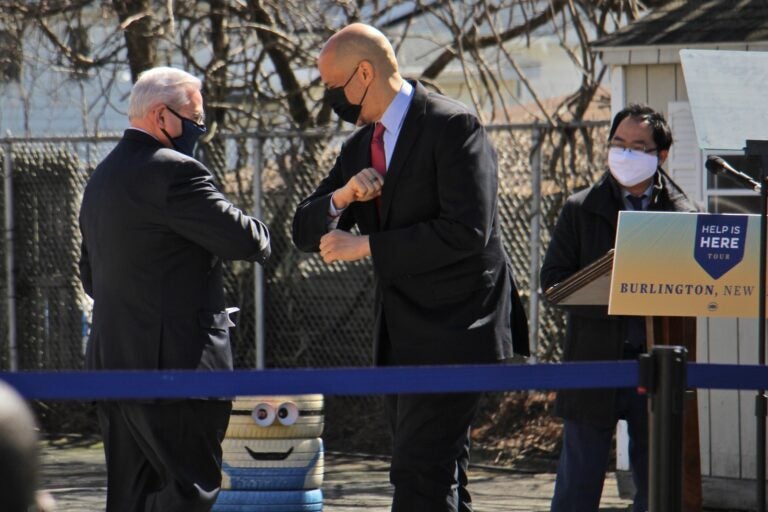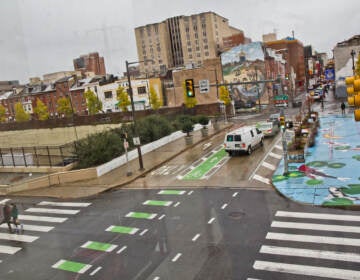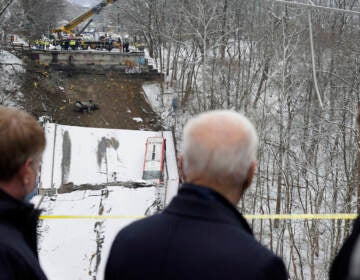What the historic $1.2 trillion infrastructure bill means for N.J.
N.J. expects to receive more than $12 billion from the bipartisan bill, passed by Congress earlier this month. Here’s an explainer of what that money could pay for.

New Jersey U.S. Sens. Robert Menendez (left) and Cory Booker bump elbows while U.S. Rep. Andy Kim looks on in Burlington, N.J. (Emma Lee/WHYY)
President Joe Biden is expected to sign the $1.2 trillion Infrastructure Investment and Jobs Act on Monday. The bipartisan bill, passed by Congress earlier this month, appropriates more than $12 billion to help address some of New Jersey’s most pressing infrastructure needs.
According to a breakdown from New Jersey Sens. Cory Booker and Bob Menendez (both Democrats), the state will get $6.8 billion to invest in highways and roads, $1.1 billion for bridge repairs, $104 million for electric vehicle initiatives, $24 million for enhancing ferry services, and $4.1 billion, over six years, to improve the state’s transit system.
New Jersey Congressman Andy Kim (D-3) said the bill will create jobs and help the state get up to safety standards.
“There are over 500 bridges, nearly 4,000 miles of highway in New Jersey that’s considered poor condition,” Kim said. “I got over 40 bridges, in just my congressional district alone, that are considered structurally deficient. And I have to drive over these with my family every single day. So it’s about making sure that we raise that bar for our safety, for our security.”
In April, the White House gave New Jersey a D-plus grade for its infrastructure, citing the need for massive investment in the state’s bridges and highways, as well as the state’s drinking water systems, and broadband internet technologies.
The American Society For Civil Engineers estimates New Jersey drivers pay $713 per year to commute on roads in need of repair, which have also contributed to longer commuting times over the last 10 years.
New Jersey’s drinking water infrastructure needs cost nearly $8.6 million over the next two decades, according to the White House report. The bill includes nearly $237 billion for federal programs geared toward drinking water rehabilitation. It’s unclear how much New Jersey will get to address drinking water needs, as state formula funding for water and sewer infrastructure has yet to be calculated.
The state expects to receive a minimum of $100 million for broadband internet infrastructure. According to the Biden administration, 31% of New Jerseyans live in an area with only one internet service provider offering minimum speeds, while 10% of state residents don’t have an internet subscription at all.
The Resilient Highways Act, a bill sponsored by Kim in June, is also included in the final legislation. It would allow the Department of Transportation to use up to 15% of funds apportioned under the National Highway Performance Program for highway projects that reduce the risk of recurring damage from extreme weather, flooding, and rising sea levels.
Kim said this was especially important in the aftermath of hurricanes Sandy and Ida, and other extreme weather events over the last few years. The state is projected to experience a greater frequency of high precipitation events and rising sea levels as a result of climate change, according to the New Jersey Climate Change Resource Center at Rutgers University.
“Just a couple days ago was the anniversary of Superstorm Sandy. And we have huge parts of my community, especially in Ocean County that were cut off from rescue and having difficulty getting to safety,” Kim said. “Just tremendous amounts of flooding of major roadways that impeded the ability for evacuations, impeded the ability for recovery. That’s what we’re trying to change.”
Ray Cantor, vice president of government affairs at the New Jersey Business and Industry Association, said the infrastructure bill will make the state more competitive in a growing global economy. This summer, the NJBIA joined more than 100 local and state business organizations in lobbying for the bill’s passage.
“Infrastructure stimulates jobs up and down the supply chain,” Cantor said. “We are a logistic state. We have the largest port on the northeast, and more and more people are buying merchandise online. So we have a real significant need to make sure that all aspects of our transportation sector work.”
The bill also provides roughly $40 billion to Amtrak to help build the Gateway Project, which would replace a series of aging railway tunnels under the Hudson River between New Jersey and New York.
The Brookings Institute predicts most projects the bill aims to fund will not begin “overnight.” The speed at which funding will reach different parts of the country may vary by the type of project, and the types of programs distributing the funds.

Get daily updates from WHYY News!
WHYY is your source for fact-based, in-depth journalism and information. As a nonprofit organization, we rely on financial support from readers like you. Please give today.







